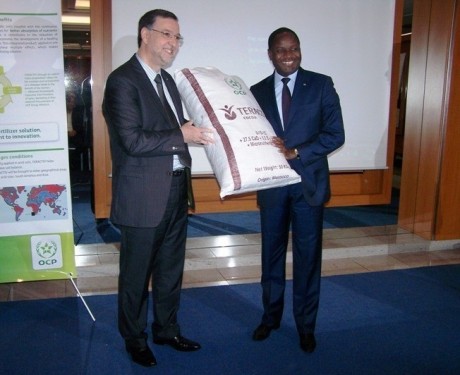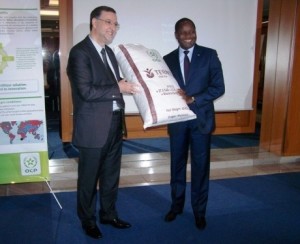
 Just few days after King Mohammed VI paid official visits to three African states, including Cote de’Ivoire, and renewed Morocco’s commitment to African solidarity to meet the economic challenges facing the region, the state-owned “Office Chérifien des Phosphates”, or OCP, has supplied Ivory Coast with a first batch of fertilizers that will help upgrade cocoa crop output in the West African country.
Just few days after King Mohammed VI paid official visits to three African states, including Cote de’Ivoire, and renewed Morocco’s commitment to African solidarity to meet the economic challenges facing the region, the state-owned “Office Chérifien des Phosphates”, or OCP, has supplied Ivory Coast with a first batch of fertilizers that will help upgrade cocoa crop output in the West African country.The Moroccan group, the world phosphates extraction and transformation leader, has delivered a cargo of 10,000 tons of the fertilizer called ‘Cocoa Teractiv’.
The fertilizer delivery was made part of the commitment to a strategic partnership for the development of Cacao farming in West Africa, signed by all the key players in this sector during the 1st World Forum of Cocoa, held in Abidjan in November 2012.
This partnership, initiated by the Government of the Netherlands and adopted by the OCP Group as an integral part of its African strategy, falls in line with the OCP Africa vision which seeks to conduct a sustainable development oriented green revolution that will promote the agricultural value added in the continent, says the group in a press release.
The OCP has repeatedly pledged to promote the improvement of agricultural productivity through fertilizer supply to African countries, and especially to small farmers, who play a key role in food security with subsistence crops, and also to those who grow export oriented crops that earn African economies foreign currencies.
While the OCP was channeling its fertilizers to the West African country, the International Committee of the Red Cross (ICRC) and the Red Cross Society of Côte d’Ivoire were distributing seed and farming tools to some 12,000 farmers from 12 villages in south-western Côte d’Ivoire to re-launch food crops.
“The violence that erupted in the western part of the country in 2012 forced many people to seek refuge in neighbouring Liberia or in the town of Taï,” David Goetschmann, head of the ICRC sub-delegation in Guiglo, was quoted as saying in an ICRC release.
“When the displaced people, most of whom are cocoa and coffee farmers, returned to their land, they found their grain storage areas looted and their crops destroyed.”
The farmers – like the families that in some cases have to play host to them – are having difficulty supporting themselves amid still unstable security conditions. The seed distribution is taking place to meet their needs just before the rainy season.
“We will be providing the farmers with support and advice to ensure that they will have seed set aside for next year,” said Mr Goetschmann. “It is important that they be able to live in dignity and regain the ability to fend for themselves without depending on help from a humanitarian organization.”
In May, another 6,000 people will receive similar aid in Bin-Houyé sub-prefecture, in the same area
